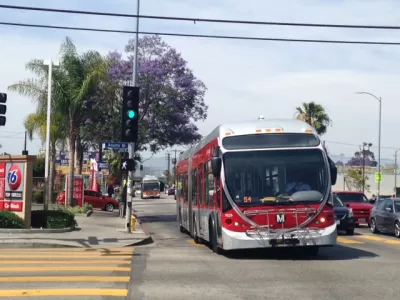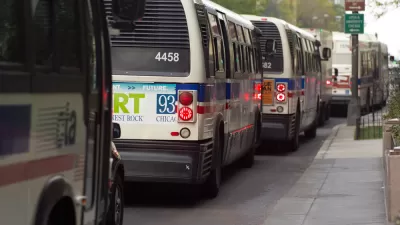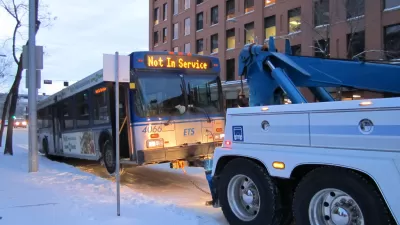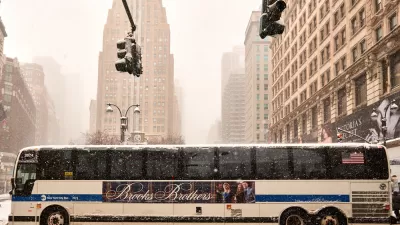The news about the decline of bus ridership around the country is making the rounds again. The future of bus transit as we know it seems to be in question.

David Harrison was the first to raise the alarms about declining bus ridership in August, with an article headlined by concern for the threat of declining ridership to the future of transit systems. "A staple of American urban life—the city bus—is in a state of steady decline," writes Harrison in the lede for the Wall Street Journal, which might be behind a paywall for some readers.
Leah Binkovitz followed that article with coverage for The Urban Edge that will be more accessible that the Wall Street Journal, tying the narrative back to the experience in Houston, which has proven to be an outlier after a bus system redesign in 2015.
Jeff Spross also followed up on the Wall Street Journal article. Here's Spross's take on the situation with bus transit, summarized:
You might be inclined to ask, so what? There are still subways, and people have cars. But the struggles of city buses are actually a microcosm for the full sweep of America's economic dysfunction. And like many parts of the economy, it never truly recovered from the Great Recession.
Another article from this month provides a local case study for the decline in bus ridership. Yonah Freemark wrote for Streetsblog USA of Los Angeles' declining bus ridership in a time of massive expansion of the regional rail system. That decline is placed in context of a popular narrative about Los Angeles achieving some kind of public transit enlightenment. The truth, according to Freemark, "is a little less dramatic," because "L.A.’s transit service was never that bad, while its purported transit renaissance has yet to translate into more people opting for buses and trains." The article includes an in-depth critique of the Los Angeles County Metropolitan Transportation Authority (Metro) transit system.
Planetizen's ongoing coverage of bus ridership last saw a crest in early 2017, when bus ridership data showed declines in Los Angeles and Tampa Bay, and transit ridership declined (rail included) in Washington, D.C. and Denver.
FULL STORY: America’s Buses Lose Riders, Imperiling Their Future

Study: Maui’s Plan to Convert Vacation Rentals to Long-Term Housing Could Cause Nearly $1 Billion Economic Loss
The plan would reduce visitor accommodation by 25,% resulting in 1,900 jobs lost.

North Texas Transit Leaders Tout Benefits of TOD for Growing Region
At a summit focused on transit-oriented development, policymakers discussed how North Texas’ expanded light rail system can serve as a tool for economic growth.

Why Should We Subsidize Public Transportation?
Many public transit agencies face financial stress due to rising costs, declining fare revenue, and declining subsidies. Transit advocates must provide a strong business case for increasing public transit funding.

How to Make US Trains Faster
Changes to boarding platforms and a switch to electric trains could improve U.S. passenger rail service without the added cost of high-speed rail.

Columbia’s Revitalized ‘Loop’ Is a Hub for Local Entrepreneurs
A focus on small businesses is helping a commercial corridor in Columbia, Missouri thrive.

Invasive Insect Threatens Minnesota’s Ash Forests
The Emerald Ash Borer is a rapidly spreading invasive pest threatening Minnesota’s ash trees, and homeowners are encouraged to plant diverse replacement species, avoid moving ash firewood, and monitor for signs of infestation.
Urban Design for Planners 1: Software Tools
This six-course series explores essential urban design concepts using open source software and equips planners with the tools they need to participate fully in the urban design process.
Planning for Universal Design
Learn the tools for implementing Universal Design in planning regulations.
Ascent Environmental
Borough of Carlisle
Institute for Housing and Urban Development Studies (IHS)
City of Grandview
Harvard GSD Executive Education
Toledo-Lucas County Plan Commissions
Salt Lake City
NYU Wagner Graduate School of Public Service





























